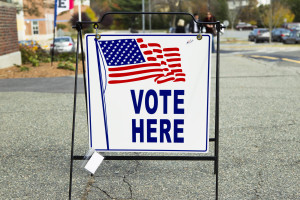In 2016, Maine became the first state to adopt a ranked-choice voting system for congressional offices. A few states use rank-choice voting in presidential primary elections, while several municipal governments use rank-choice voting in local elections.
The Maine system has been tested by a series of lawsuits. The latest challenge relied on an expert’s testimony that the system disenfranchises older and less educated voters. A federal judge recently rejected that challenge and declined to enter a preliminary injunction to block Maine’s use of the law in the November congressional election.
What Is Ranked-Choice Voting?
Ranked-choice voting is a system that allows voters to rank their preferences among candidates for an office. Rather than voting for a single candidate, voters mark their ballots for their first choice, second choice, and so on.
In a ranked-choice voting system, a candidate who is ranked first by more than 50{d61575bddc780c1d4ab39ab904bf25755f3b8d1434703a303cf443ba00f43fa4} of voters wins the election. If no candidate meets that threshold, the candidate who has the fewest first-choice votes is eliminated. Voters who ranked that candidate first then have their second choice re-ranked as their first choice.
If a candidate gains more than 50{d61575bddc780c1d4ab39ab904bf25755f3b8d1434703a303cf443ba00f43fa4} of the re-ranked votes, that candidate wins. If no candidate crosses the 50{d61575bddc780c1d4ab39ab904bf25755f3b8d1434703a303cf443ba00f43fa4} threshold during the second count, the process continues until a candidate receives more than 50{d61575bddc780c1d4ab39ab904bf25755f3b8d1434703a303cf443ba00f43fa4} of original or re-ranked first choice votes.
The Ranked-Choice Controversy
In a traditional voting system (sometimes known as cardinal or plurality voting) the candidate with the most votes wins, even if most voters voted against that candidate. For example, the winner of a four-candidate contest might receive only 35{d61575bddc780c1d4ab39ab904bf25755f3b8d1434703a303cf443ba00f43fa4} of the total vote, with the other 65{d61575bddc780c1d4ab39ab904bf25755f3b8d1434703a303cf443ba00f43fa4} spread among the other three candidates.
Supporters of ranked-choice voting argue that the system is more democratic because it prevents a candidate from winning automatically when most voters preferred a different candidate. They also suggest that plurality voting discourages candidates from running because they worry that voters might split their votes between two candidates who hold similar positions. Potential candidates may opt not to run because they fear that vote-splitting will allow a candidate to win who holds less popular positions.
Opponents contend that ranked-choice voting creates “a complex and confusing process that threatens to reduce voter participation and distort election outcomes.” They point out that the system might not improve democratic outcomes because it can produce a winner who was the first choice of a comparatively small number of voters.
Challenges to Maine’s Ranked-Choice Voting Law
Maine’s ranked-choice voting law was enacted by referendum in 2016. The Maine Supreme Court reviewed the law in 2017 and decided that it violated the Maine Constitution as it applied to general elections for statewide offices. When the state legislature attempted to delay the law’s application to congressional elections, the attempt was vetoed in a new referendum.
In 2018, Democrat Jared Golden defeated Republican Rep. Bruce Poliquin in a congressional race. Poliquin was leading with a plurality of votes after the first count, but when votes given to independent candidates were re-ranked, Golden emerged as the victor.
Poliquin then filed a federal lawsuit challenging the constitutionality of Maine’s ranked-choice voting law. That lawsuit contended that congressional elections must be decided by a plurality vote. Judge Lance Walker ruled that the Constitution gives states the authority to decide how to run elections.
This year, four Maine voters — three Republicans and one independent —filed another federal lawsuit to block the law. That lawsuit was primarily based on the testimony of an expert witness.
Voting Expert’s Testimony
Nolan McCarty, a professor of political science at Princeton, testified on behalf of the plaintiffs. McCarty cited his own research findings that some voters are confused by rank-choice voting and are disenfranchised because they do not fill out their ballots completely.
McCarty based his testimony on a statistical analysis of ranked-choice voting. The analysis primarily considered voting in municipal elections in other states. McCarty’s data showed that some ranked-choice voters made only one choice and others left their ballots entirely blank.
Since the law does not require any voter to mark a ballot or to vote for more than one candidate, McCarty needed to explain why the decision to vote for one or no candidate reflected confusion rather than choice. McCarty found that older and less educated voters were more likely to vote for only one candidate. He concluded that those voters failed to rank-order their preference for candidates because they didn’t understand how the system works.
Court’s Analysis of Expert’s Testimony
Judge Walker heard the new lawsuit. He decided that McCarty’s data did not support his conclusion that ranked-choice voting disenfranchises older or less educated voters.
Judge Walker rejected McCarty’s data as “wobbly.” The judge observed that McCarty’s analysis was “equal parts inductive reasoning and condescension.” Ranking candidates by order of preference is not a difficult concept to understand, and there is no reason to assume that older voters are less capable than younger voters of filling out a ranked-choice ballot.
Voters may have many reasons for choosing only one candidate. They might not want to rank other candidates because they don’t care who holds the office if their favored candidate doesn’t win. They may cast an unmarked ballot as a protest against all the candidates. Judge Walker concluded that McCarty had no basis beyond guesswork for deciding that incomplete ballots reflect confusion rather than deliberate choice.
In the absence of convincing evidence that the ranked-choice voting system disenfranchises voters, Judge Walker declined to enter a preliminary injunction. For the moment, ranked-choice voting will continue to be used in Maine primary and congressional elections.




